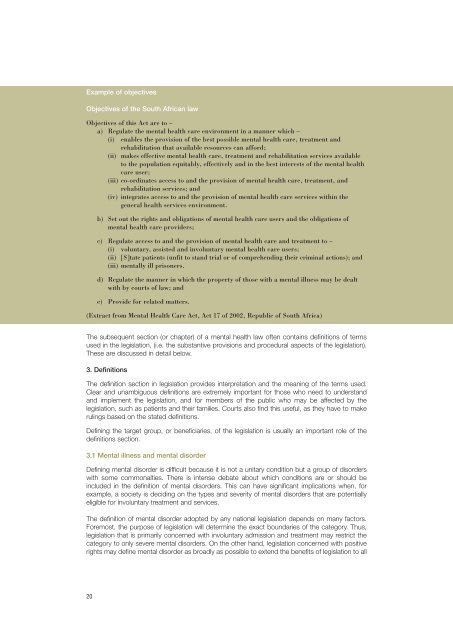human rights and legislation who resource book on mental health
human rights and legislation who resource book on mental health
human rights and legislation who resource book on mental health
Create successful ePaper yourself
Turn your PDF publications into a flip-book with our unique Google optimized e-Paper software.
Example of objectives<br />
Objectives of the South African law<br />
Objectives of this Act are to –<br />
a) Regulate the <strong>mental</strong> <strong>health</strong> care envir<strong>on</strong>ment in a manner which –<br />
(i) enables the provisi<strong>on</strong> of the best possible <strong>mental</strong> <strong>health</strong> care, treatment <str<strong>on</strong>g>and</str<strong>on</strong>g><br />
rehabilitati<strong>on</strong> that available <str<strong>on</strong>g>resource</str<strong>on</strong>g>s can afford;<br />
(ii) makes effective <strong>mental</strong> <strong>health</strong> care, treatment <str<strong>on</strong>g>and</str<strong>on</strong>g> rehabilitati<strong>on</strong> services available<br />
to the populati<strong>on</strong> equitably, effectively <str<strong>on</strong>g>and</str<strong>on</strong>g> in the best interests of the <strong>mental</strong> <strong>health</strong><br />
care user;<br />
(iii) co-ordinates access to <str<strong>on</strong>g>and</str<strong>on</strong>g> the provisi<strong>on</strong> of <strong>mental</strong> <strong>health</strong> care, treatment, <str<strong>on</strong>g>and</str<strong>on</strong>g><br />
rehabilitati<strong>on</strong> services; <str<strong>on</strong>g>and</str<strong>on</strong>g><br />
(iv) integrates access to <str<strong>on</strong>g>and</str<strong>on</strong>g> the provisi<strong>on</strong> of <strong>mental</strong> <strong>health</strong> care services within the<br />
general <strong>health</strong> services envir<strong>on</strong>ment.<br />
b) Set out the <str<strong>on</strong>g>rights</str<strong>on</strong>g> <str<strong>on</strong>g>and</str<strong>on</strong>g> obligati<strong>on</strong>s of <strong>mental</strong> <strong>health</strong> care users <str<strong>on</strong>g>and</str<strong>on</strong>g> the obligati<strong>on</strong>s of<br />
<strong>mental</strong> <strong>health</strong> care providers;<br />
c) Regulate access to <str<strong>on</strong>g>and</str<strong>on</strong>g> the provisi<strong>on</strong> of <strong>mental</strong> <strong>health</strong> care <str<strong>on</strong>g>and</str<strong>on</strong>g> treatment to –<br />
(i) voluntary, assisted <str<strong>on</strong>g>and</str<strong>on</strong>g> involuntary <strong>mental</strong> <strong>health</strong> care users;<br />
(ii) [S]tate patients (unfit to st<str<strong>on</strong>g>and</str<strong>on</strong>g> trial or of comprehending their criminal acti<strong>on</strong>s); <str<strong>on</strong>g>and</str<strong>on</strong>g><br />
(iii) <strong>mental</strong>ly ill pris<strong>on</strong>ers.<br />
d) Regulate the manner in which the property of those with a <strong>mental</strong> illness may be dealt<br />
with by courts of law; <str<strong>on</strong>g>and</str<strong>on</strong>g><br />
e) Provide for related matters.<br />
(Extract from Mental Health Care Act, Act 17 of 2002, Republic of South Africa)<br />
The subsequent secti<strong>on</strong> (or chapter) of a <strong>mental</strong> <strong>health</strong> law often c<strong>on</strong>tains definiti<strong>on</strong>s of terms<br />
used in the <str<strong>on</strong>g>legislati<strong>on</strong></str<strong>on</strong>g>, (i.e. the substantive provisi<strong>on</strong>s <str<strong>on</strong>g>and</str<strong>on</strong>g> procedural aspects of the <str<strong>on</strong>g>legislati<strong>on</strong></str<strong>on</strong>g>).<br />
These are discussed in detail below.<br />
3. Definiti<strong>on</strong>s<br />
The definiti<strong>on</strong> secti<strong>on</strong> in <str<strong>on</strong>g>legislati<strong>on</strong></str<strong>on</strong>g> provides interpretati<strong>on</strong> <str<strong>on</strong>g>and</str<strong>on</strong>g> the meaning of the terms used.<br />
Clear <str<strong>on</strong>g>and</str<strong>on</strong>g> unambiguous definiti<strong>on</strong>s are extremely important for those <str<strong>on</strong>g>who</str<strong>on</strong>g> need to underst<str<strong>on</strong>g>and</str<strong>on</strong>g><br />
<str<strong>on</strong>g>and</str<strong>on</strong>g> implement the <str<strong>on</strong>g>legislati<strong>on</strong></str<strong>on</strong>g>, <str<strong>on</strong>g>and</str<strong>on</strong>g> for members of the public <str<strong>on</strong>g>who</str<strong>on</strong>g> may be affected by the<br />
<str<strong>on</strong>g>legislati<strong>on</strong></str<strong>on</strong>g>, such as patients <str<strong>on</strong>g>and</str<strong>on</strong>g> their families. Courts also find this useful, as they have to make<br />
rulings based <strong>on</strong> the stated definiti<strong>on</strong>s.<br />
Defining the target group, or beneficiaries, of the <str<strong>on</strong>g>legislati<strong>on</strong></str<strong>on</strong>g> is usually an important role of the<br />
definiti<strong>on</strong>s secti<strong>on</strong>.<br />
3.1 Mental illness <str<strong>on</strong>g>and</str<strong>on</strong>g> <strong>mental</strong> disorder<br />
Defining <strong>mental</strong> disorder is difficult because it is not a unitary c<strong>on</strong>diti<strong>on</strong> but a group of disorders<br />
with some comm<strong>on</strong>alties. There is intense debate about which c<strong>on</strong>diti<strong>on</strong>s are or should be<br />
included in the definiti<strong>on</strong> of <strong>mental</strong> disorders. This can have significant implicati<strong>on</strong>s when, for<br />
example, a society is deciding <strong>on</strong> the types <str<strong>on</strong>g>and</str<strong>on</strong>g> severity of <strong>mental</strong> disorders that are potentially<br />
eligible for involuntary treatment <str<strong>on</strong>g>and</str<strong>on</strong>g> services.<br />
The definiti<strong>on</strong> of <strong>mental</strong> disorder adopted by any nati<strong>on</strong>al <str<strong>on</strong>g>legislati<strong>on</strong></str<strong>on</strong>g> depends <strong>on</strong> many factors.<br />
Foremost, the purpose of <str<strong>on</strong>g>legislati<strong>on</strong></str<strong>on</strong>g> will determine the exact boundaries of the category. Thus,<br />
<str<strong>on</strong>g>legislati<strong>on</strong></str<strong>on</strong>g> that is primarily c<strong>on</strong>cerned with involuntary admissi<strong>on</strong> <str<strong>on</strong>g>and</str<strong>on</strong>g> treatment may restrict the<br />
category to <strong>on</strong>ly severe <strong>mental</strong> disorders. On the other h<str<strong>on</strong>g>and</str<strong>on</strong>g>, <str<strong>on</strong>g>legislati<strong>on</strong></str<strong>on</strong>g> c<strong>on</strong>cerned with positive<br />
<str<strong>on</strong>g>rights</str<strong>on</strong>g> may define <strong>mental</strong> disorder as broadly as possible to extend the benefits of <str<strong>on</strong>g>legislati<strong>on</strong></str<strong>on</strong>g> to all<br />
20

















